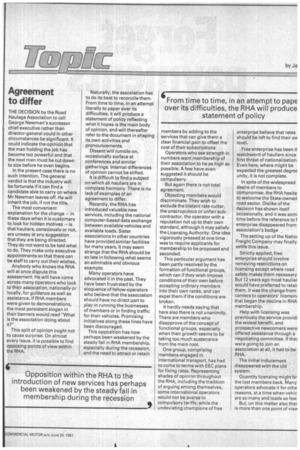Agreement to differ
Page 61

If you've noticed an error in this article please click here to report it so we can fix it.
THE DECISION by the Road Haulage Association to call George Newman's successor chief executive rather than director-general could in other circumstances be significant. It could indicate the opinion that the man holding the job has become too powerful and that the next man must be cut down to size before he even begins.
In the present case there is no such intention. The general verdict is that the industry will be fortunate if it can find a candidate able to carry on where Mr Newman leaves off. He will inherit the job, if not the title.
The most convenient explanation for the change — in these days when it is customary to look for hidden motives — is that hauliers, consciously or not, are uneasy at any suggestion that they are being directed. They do not want to be told what to do. They make only executive appointments so that there can be staff to carry out their wishes.
Anybody who knows the RHA will at once dispute this assessment. He will have come across many operators who look to their association, nationally or locally, for guidance as well as assistance. If RHA members were given to demonstrations, the most persistent slogan in their banners would read "What is the association doing about it?"
This split of opinion ought not to cause surprise. On almost every issue, it is possible to find opposing points of view within the RHA. Naturally, the association has to do its best to reconcile them. From time to time, in an attempt literally to paper over its difficulties, it will produce a statement of policy reflecting what it hopes is the main body of opinion, and will thereafter refer to the document in shaping its own activities and pronouncements.
Dissent will rumble on, occasionally surface at conferences and similar gatherings. Internal differences of opinion cannot be stifled.
It is difficult to find a subject on which all hauliers are in complete harmony. There is no lack of examples of an agreement to differ.
Recently, the RHA has introduced valuable new services, including the national computer-based data exchange between available vehicles and available loads. Sister associations in other countries have provided similar facilities for many years. It may seem strange that the RHA should be so late in following what seems an admirable and obvious example.
Many operators have advocated it in the past. They have been frustrated by the eloquence of fellow-operators who believe that the association should have no direct part to play in running the businesses of members or in finding traffic for their vehicles. Promising initiatives along these lines have been discouraged.
This opposition has now perhaps been weakened by the steady fall in RHA membership, especially during the recession, and the need to attract or retain members by adding to the services that can give them a clear financial gain to offset the cost of their subscriptions Operators who see strength in numbers want membership of their association to be as high as possible. A few have even suggested it should be compulsory.
But again there is not total agreement.
Objecting members would discriminate. They wish to exclude the blatant rate-cutter, the unscrupulous or unfair subcontractor, the operator with a reputation not up to their own 'standard, although it may satisfy the Licensing Authority. One idea vigorously pressed at one time was to require applicants for membership to be proposed and seconded.
This particular argument has been partly resolved by the formation of functional groups, which can if they wish impose conditions of their own before accepting ordinary members into their own ranks, and can expel them lithe conditions are broken.
It hardly needs saying that here also there is not unanimity. There are members who disapprove of the concept of functional groups, especially when their growth seems to be taking too much sustenance from the main root.
One group, comprising members engaged in international transport, has had to come to terms with EEC plans for fixing rates. Representing shades of opini-rn throughout the RHA, including the tradition of arguing among themselves, some international operators would not be averse to compulsory tariffs, while the undeviating champions of free enterprise believe that rates should be left to find their ovs level.
Free enterprise has been 0 watchword of hauliers since first threat of nationalisation Even here, where might be expected the greatest deg reE unity, it is not complete.
In spite of the widespread desire of members to compromise, the RHA hesita to welcome the State-owned road sector. Dislike of the decision has shown itself occasionally, and it was sorni time before the reference to f enterprise disappeared from association's badge The setting up of the Natior Freight Company may finally settle this issue.
Strictly applied, free enterprise should involve removing restrictions on licensing except where road safety makes them necessary But 12 years ago most haulier would have preferred to retair them. It was the change from carriers to operators' licensin! that began the decline in RHA membership.
Help with licensing was previously the service providi the widest benefit, and prospective newcomers were offered assistance through a negotiating committee. If the) were going to join an association at all, it had to be RHA.
The initial inducement disappeared with the old system.
Quantity licensing might br the lost members back. Many operators advocate it for othe reasons, at a time when vehic are so many and loads so few But, on this matter also ther is more than one point of viev,








































































































